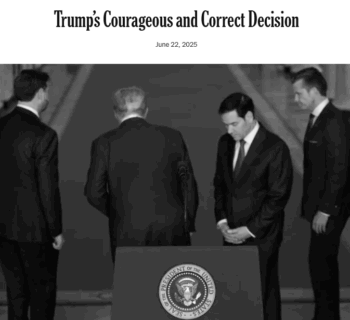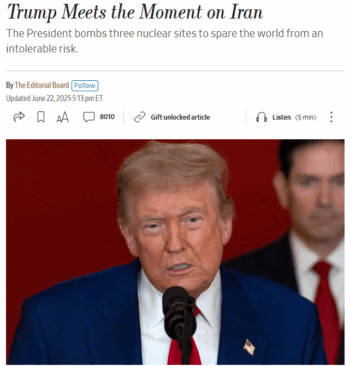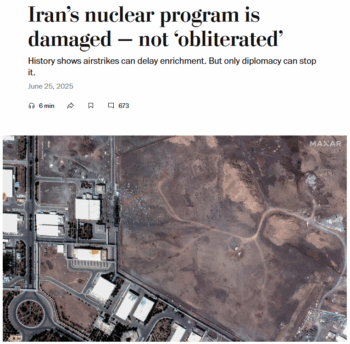Aggression is widely understood as the most serious form of the illegal use of force under international law. At the post–World War II Nuremberg Trials, British Judge Norman Birkett said:
To initiate a war of aggression…is not only an international crime; it is the supreme international crime, differing only from other war crimes in that it contains within itself the accumulated evil of the whole.
UN General Assembly Resolution 3314 lists seven acts that constitute aggression, including:
- The invasion or attack by the armed forces of a state of the territory of another State….
- Bombardment by the armed forces of a state against the territory of another state, or the use of any weapons by a state against the territory of another state.
In a clear instance of such aggression, 125 US military aircraft (along with a submarine) unleashed 75 weapons against Iran on June 21, including 14 GBU-57 Massive Ordnance Penetrators (MOPs), each of which weighs 30,000 pounds (BBC, 6/23/25). The MOPs are the most powerful non-nuclear weapons in the US arsenal (Democracy Now!, 6/23/25).
‘Brilliant military operation’

The New York Times‘ Bret Stephens (6/22/25) acknowledged that US intelligence maintained that “Iran’s leaders had not yet decided to build a bomb”—but he argued that to act “amid uncertainty…is the essence of statesmanship.”
Rather than condemning this blatant violation of international law, US corporate media commentators gushed over what the Boston Globe (6/24/25) called a “brilliant military operation.” The Wall Street Journal (6/22/25) gave President Donald Trump “credit…for meeting the moment.”
To the New York Times’ Bret Stephens (6/22/25), Trump made “a courageous and correct decision that deserves respect.” “The president acted before it was too late,” he wrote. “It is the essence of statesmanship.”
For the Washington Post’s Max Boot (6/25/25), it’s “good news…that both Israel and the United States showed they can bombard Iranian nuclear facilities and other targets at will.”
Rather than toasting aggression, these observers could have used their platforms to try to help foster a political climate that prioritizes peace and the international legal principles that could help create a less violent world.
Meanwhile, some opinion mongers thought the US was at risk of insufficiently violating international law. The Post’s editorial board (6/22/25) said Trump
should ensure that Iran’s nuclear program is demolished, as he appeared to claim it was on Saturday. This would mean the destruction of the targeted sites plus any residual weapons-building capacity.
In other words, the authors are glad that the US bombed Iran in violation of international law, and think it might be best to do more of the same.
A Journal editorial (6/23/25) put forth a similar view, warning that Trump will “squander” any “gains” that the US and Israel may have made against Iran if he “lets Iran take a breather, retain any enriched uranium it has secretly stored, and then rearm. But the last fortnight creates a rare opportunity for a more peaceful Middle East.” I’m not a big Orwell fan, but there’s something to his vision of the propaganda slogan “war is peace.”
Upside-down world

Iran “now knows Mr. Trump isn’t bluffing,” the Wall Street Journal (6/22/25) wrote. Does the paper imagine that Iran thought Trump was “bluffing” when he assassinated Qasem Soleimani, the nation’s top military leader, in 2020?
These celebrations of bomb-dropping occur in an upside-down world, where Iran is an aggressor against the United States. One form of this lie is accusing Iran of wantonly killing Americans or seeking to do so. The Journal (6/22/25) cited “1,000 Americans killed by Iran-supplied roadside bombs and other means”—referring to the dubious claim that Iran is responsible for US soldiers killed during the illegal invasion and occupation of Iraq (Progressive, 1/7/20). Thus, to the editors, “Mr. Trump had to act to stop the threat in front of him to protect America.”
For Boot (6/22/25), Iran is a “predator” that the United States and Israel “will still have to deal with…for years to come.”
It would be nice to be able to assess the evidence for these allegations, but the authors don’t so much as hint at any. What is well documented, though, is that the US has been the aggressor in its longrunning war with Iran.
The US ruling class initiated the conflict by overthrowing Iran’s democratically elected Prime Minister Mohammad Mosaddegh in 1953 (NPR, 2/7/19), propping up the Shah’s torture regime for 26 years (BBC, 6/3/16; AP, 2/6/19), sponsoring the Iraqi invasion of Iran and helping Iraq use chemical weapons against Iran (Foreign Policy, 8/26/13), supporting Israel’s years-long campaign of murdering Iranian scientists (Responsible Statecraft, 12/21/20), and asphyxiating Iran’s civilian population through economic sanctions (Human Rights Watch, 10/29/19).
In other words, the US has been prosecuting a war against the Iranian people for more than 70 years, and Iran hasn’t done anything remotely comparable to the US, but the corporate media pretends that the inverse is true.
The consent manufacturers went even further, characterizing Iran as a threat to the world more generally. The Journal (6/22/25) said “Iran has been waging regional and terrorist war for decades,” and that “the world is safer” because the US bombed the country. Stephens proclaimed the Iranian government “the world’s leading state sponsor of terrorism,” a claim Boot (6/25/25) echoed, writing that the nation has a “decades-long track record as the No. 1 state sponsor of terrorism.” Sickeningly, Antony Blinken (New York Times, 6/24/25), a leading architect of the genocide of Gaza’s civilian population, called Iran “a leading state sponsor of terrorism; a destructive and destabilizing force via its proxies in Lebanon, Syria, Gaza, Yemen and Iraq.”
As usual, none of these writers bothered to say which acts of “terrorism” Iran has backed, never mind provide proof. Of course, if one wanted to make a serious argument that Iran has won the planet’s “state sponsor of terrorism” gold medal, then it would be necessary to show how they trumped, say, US support for Al Qaeda in Syria. For such a case to be convincing, it would furthermore be necessary to assess where bankrolling a genocide ranks in the terror-sponsoring Olympics.
‘A grave nuclear threat’

Max Boot (Washington Post, 6/25/25): “The good news is that both Israel and the United States showed they can bombard Iranian nuclear facilities and other targets at will.”
In the fantasy world where Iran is a grave danger to the US and indeed the world, then wrongly implying that it has or is about to have nuclear weapons packs a heavier punch. The Journal (6/22/25) said, “President Trump’s decision to strike Iran’s three most significant nuclear sites on Saturday helped rid the world of a grave nuclear threat.” The editorial would later add, “Ayatollah Ali Khamenei wanted a bomb more than peace.”
Boot (6/25/25) wrote that “preliminary Israeli intelligence assessments [of the US bombing of Iran] conclude that the damage to the Iranian nuclear weapons program was more extensive—enough to set back the program by several years.” Stephens began his piece:
For decades, a succession of American presidents pledged that they were willing to use force to prevent Iran from acquiring nuclear weapons. But it was President Trump who, by bombing three of Iran’s key nuclear sites on Sunday morning, was willing to demonstrate that those pledges were not hollow and that Tehran could not simply tunnel its way to a bomb because no country other than Israel dared confront it.
As FAIR contributor Bryce Greene (6/23/25) recently demonstrated, there is no proof that Iran has nuclear weapons or is close to having any. Yet the op-ed pages are peppered with insinuations that Iran’s imaginary nukes legitimize the US’s aggression against the country.
A Boston Globe editorial (6/24/25) read:
After years of insisting it would not allow Iran to acquire a nuclear weapon, Israel followed through by launching a wide-ranging attack earlier this month, assassinating nuclear scientists and military leaders and destroying many sites associated with Iran’s decades-long nuclear program. Trump initially stayed on the sidelines, until Saturday when US bombers delivered the coup de grâce, destroying—or at least heavily damaging—a key underground site that only American bunker-buster bombs could reach….
Stopping Iran, whose unofficial national motto is “Death to America,’’ from gaining a nuclear weapon has rightly been a US priority for decades.
Iran’s nuclear program is now damaged but not destroyed.
What’s missing from this chatter is that, even if we lived in an alternate reality where Iran had nuclear weapons or was hours away from having them, attacking them on these grounds would not be legitimate. After all, international law does not grant states a right to attack each other on a preventive (Conversation, 6/18/25) or pre-emptive basis (Conversation, 6/23/25). This crucial point was entirely absent in the coverage I’ve discussed.
Also overlooked are the 90 nuclear warheads that Israel is believed to have, as well as the more than 5,200 that the US reportedly possesses, none of which apparently constitute “a grave nuclear threat,” even as it’s not Iran but the US and Israel that routinely carry out full-scale invasions and occupations of nations in West Asia.
Whether it’s Iran’s supposed support for terrorism or Iran’s nonexistent and non-imminent nuclear weapons, the propaganda follows the same formula: make an unsubstantiated claim about Iranian malfeasance, and use that as a premise on which to defend Washington openly carrying out acts of aggression, perhaps the gravest violation of international law.
If you want the US and Israel to stop killing and immiserating people in Iran, remember this pattern and get used to debunking it. Because, last week’s ceasefire notwithstanding, the US/Israeli war on Iran isn’t over.
This content originally appeared on FAIR and was authored by Gregory Shupak.